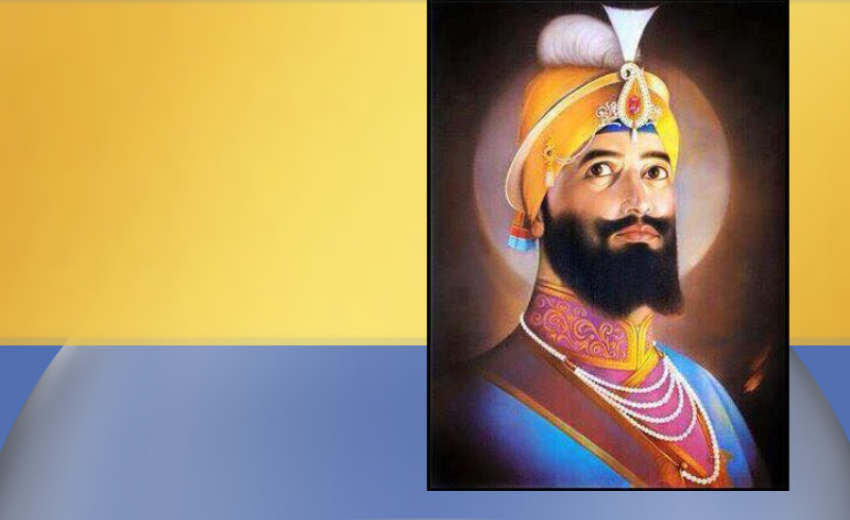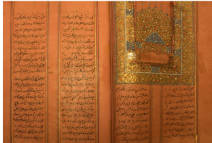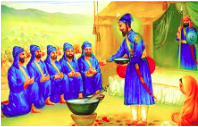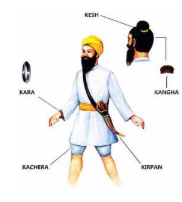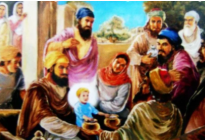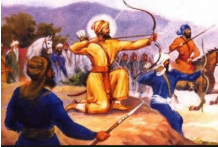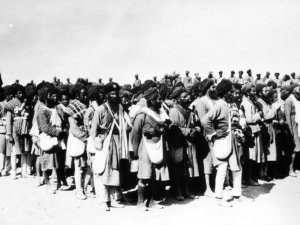Guru Gobind Singh, the tenth Sikh Guru, is celebrated for his profound teachings on faith, courage, justice, and unity. This article explores the timeless lessons from his life and works, emphasizing the key values he instilled in his followers. Guru Gobind Singh's unwavering faith in God, despite facing immense personal losses, highlights the importance of inner resilience and spiritual commitment. His courage to defend truth and justice, especially in the face of oppression, teaches the significance of standing up for what is right. The Guru’s emphasis on self-discipline, personal responsibility, and sacrifice for a higher cause guides ethical living and community service. His advocacy for the equality of all people, regardless of caste, gender, or religion, underscores the relevance of inclusivity and social justice. Additionally, Guru Gobind Singh’s promotion of education, both intellectual and spiritual, reinforces the need for lifelong learning and moral development. His leadership style, rooted in humility and empowerment, offers valuable lessons for modern leaders. Through the teachings of Guru Gobind Singh, individuals are encouraged to lead lives of integrity, compassion, and unity, making his legacy a timeless source of inspiration for the world today.
Introduction
Guru Gobind Singh, the tenth Sikh Guru, is one of history's most influential spiritual leaders, known for his remarkable vision, courage, and wisdom. Born in 1666, he became the Guru at a young age following the martyrdom of his father, Guru Tegh Bahadur, in 1675. Guru Gobind Singh faced immense personal loss, political strife, and external persecution throughout his life. Yet, he remained steadfast in his mission to uphold the principles of righteousness, justice, and equality. His contributions to Sikhism and humanity are immeasurable, particularly through the creation of the Khalsa, the empowerment of his followers, and the promotion of moral and spiritual values [1-7].
Guru Gobind Singh’s teachings transcend time, offering profound insights into how individuals should live with purpose, resilience, and compassion [8-9]. His legacy continues to inspire millions worldwide, with his principles of faith, discipline, selflessness, and social justice remaining as relevant today as they were in the 17th century. This article delves into the key lessons from his life and works, examining how his messages of unity, sacrifice, leadership, and spiritual commitment guide contemporary society. The timeless wisdom of Guru Gobind Singh challenges us to lead lives of integrity, courage, and service to others.
The Power of Faith and Spiritual Commitment
Guru Gobind Singh’s life is a testament to the unwavering strength that comes from deep faith in God. Despite facing immense personal tragedies, including the martyrdom of his father, Guru Tegh Bahadur, his mother, Mata Gujari Ji, and his four sons, Guru Gobind Singh remained unwavering in his faith in God and continued to lead with integrity and grace. His strength of faith was exemplified when he composed the Zafarnama (Epistle of Victory), a letter to Emperor Aurangzeb after suffering great personal losses. In this letter, the Guru expressed his unwavering belief in God’s justice, displaying his deep spiritual commitment even in severe adversity [10-11].
His commitment to God is encapsulated in his teachings, where he emphasized the importance of devotion, meditation, and selflessness. One of the most profound aspects of Guru Gobind Singh's spirituality is the concept of "Chardi Kala"—the state of high spirits and optimism, even in the face of adversity. Guru Gobind Singh taught that a true Sikh should maintain inner resilience and positivity, trusting in God's will regardless of the circumstances. This lesson has profound implications for the challenges individuals face today, urging them to cultivate inner strength through faith and positive thinking.
The Courage to Defend Truth and Justice
Guru Gobind Singh’s life was marked by a relentless pursuit of justice and the defence of truth. Throughout his life, he faced significant oppression, particularly from the Mughal Empire, which sought to suppress the religious freedom of the Sikhs. Rather than retreating in the face of persecution, Guru Gobind Singh boldly stood his ground and fought to protect the rights of the oppressed [1-3].
One of the most iconic moments in his life was the formation of the Khalsa in 1699, a group of baptized Sikhs committed to upholding righteousness and justice. The creation of the Khalsa was not just a military organization but a spiritual community dedicated to living according to the highest principles of Sikhism. Guru Gobind Singh’s establishment of the Khalsa was an embodiment of his belief in standing up for truth and justice, even in the face of overwhelming odds [7-9].
In today’s world, where injustice and inequality continue to be prevalent, Guru Gobind Singh’s legacy teaches us the importance of standing up for what is right, regardless of the cost. Whether in personal or professional life, individuals are encouraged to have the courage to speak out against injustice, protect the vulnerable, and fight for the truth.
The Value of Self-Discipline and Personal Responsibility
Guru Gobind Singh’s life also emphasized the importance of self-discipline and personal responsibility. He taught that every individual must take responsibility for their own actions and that a life of integrity and righteousness is the true path to spiritual fulfillment. The Guru’s own life was an embodiment of self-discipline; despite his hardships, he remained focused on his mission and responsibilities.
The discipline that Guru Gobind Singh instilled in the Khalsa was a central component of his teachings. His creation of the five "K's" (Kesh, Kara, Kanga, Kachera, and Kirpan) was a way of instilling discipline, self-control, and mindfulness in every Sikh [12]. These articles of faith were not merely symbolic but practical tools that encouraged Sikhs to live a disciplined and spiritually centered life. They reminded the Sikh community of their commitment to truth, justice, and service.
In modern society, where distractions are rampant and personal accountability is often overlooked, Guru Gobind Singh's teachings call for cultivating discipline, responsibility, and ethical conduct. His life exemplifies how personal growth and societal impact are deeply intertwined with self-discipline and the willingness to take ownership of one’s actions.
Sacrifice for a Higher Cause
One of the most striking aspects of Guru Gobind Singh’s life was his willingness to make the ultimate sacrifice for the greater good. The martyrdom of his four sons, each of whom died in battle or through execution, exemplifies the Guru’s profound sense of commitment to a higher purpose. Despite enduring unimaginable personal loss, Guru Gobind Singh did not falter in his resolve [13-15]. His ability to rise above personal grief and continue his mission is a testament to his spiritual strength and selflessness.
Guru Gobind Singh’s life teaches that true leadership often involves sacrifice, and that one must be willing to give up personal comforts and desires for the well-being of others. In today’s world, where individualism often takes precedence, this lesson calls upon individuals to rise above selfish pursuits and consider the greater good in their actions. Whether through community service, social activism, or standing up for justice, Guru Gobind Singh’s life reminds us that sometimes sacrifice is required for lasting positive change.
The Unity of All Humanity
Guru Gobind Singh was a champion of universal equality and social justice. He vehemently opposed the rigid caste system that plagued Indian society at the time, promoting the idea that all humans are equal in God's eyes. He encouraged Sikhs to see beyond superficial divisions such as caste, race, and gender and instead recognize the shared humanity that unites all people. One of the most potent examples of his commitment to unity was his interaction with a Muslim saint, Pir Bhikan Shah. After being invited to meet the Pir, Guru Gobind Singh accepted his hospitality, highlighting the unity between different religious communities [16].
Guru Gobind Singh’s vision of a society based on equality was groundbreaking for its time. He not only advocated for the upliftment of women, encouraging their participation in all aspects of religious and social life, but also extended his compassion to people of all faiths and backgrounds. His inclusivity and respect for diversity were core tenets of his teachings.
In today’s divided world, Guru Gobind Singh’s message of unity and equality is more relevant than ever. His life teaches that true spirituality is not about segregation or exclusivity but about embracing diversity and promoting harmony. His emphasis on equality encourages individuals and societies to overcome prejudices and work toward creating a more just and inclusive world.
The Importance of Education and Knowledge
Guru Gobind Singh was a spiritual leader, scholar, and patron of education. He was deeply committed to pursuing knowledge and believed education was the key to enlightenment and social progress. Guru Gobind Singh himself was highly educated and well-versed in several languages, including Persian, Arabic, Sanskrit, and Hindi, and he encouraged his followers to seek knowledge in all forms. The Guru’s promotion of education was not limited to intellectual pursuits alone; he also emphasized the importance of moral and spiritual education. In his writings, Guru Gobind Singh stressed the need for an individual to cultivate virtues such as humility, compassion, and righteousness alongside intellectual development [17-18].
In the contemporary world, where the importance of education cannot be overstated, Guru Gobind Singh’s teachings inspire individuals to pursue academic knowledge and wisdom that fosters ethical and spiritual growth. The quest for knowledge can lead to a more enlightened and harmonious society when coupled with moral integrity.
Leadership and Empowerment
Guru Gobind Singh's leadership was not about domination or control but empowerment. He believed in empowering individuals to take charge of their lives and be responsible for their spiritual and moral development. One of the most profound examples of Guru Gobind Singh’s leadership was his creation of the Khalsa, where he transformed his followers into a robust, self-reliant community. He did not impose leadership from above but instead empowered each Sikh with the tools to lead a righteous life guided by their inner conscience and spiritual discipline. His leadership was about cultivating virtues in his followers—such as bravery, selflessness, and devotion—rather than creating a hierarchical structure [19-20]. His ability to lead by example and empower his community inspires millions.
Guru Gobind Singh’s leadership was characterized by humility, compassion, and wisdom. He led by example, demonstrating that authentic leadership is rooted in serving others. He instilled a sense of duty and honour in his followers, encouraging them to be selfless and courageous.
Today, Guru Gobind Singh's leadership style serves as a model for modern leaders. In a world that often glorifies power and authority, his emphasis on empowering others, leading with humility, and serving the greater good offers a timeless and transformative approach to leadership.
Conclusion
The life and works of Guru Gobind Singh offer profound lessons that resonate deeply in today’s world. Despite immense personal and societal challenges, his unwavering commitment to faith emphasizes the power of inner strength and resilience. Guru Gobind Singh’s courage in the face of adversity, his defence of truth and justice, and his creation of the Khalsa embody the core principles of righteousness, equality, and spiritual discipline. His teachings remind us that authentic leadership is not about control but empowering others to act with integrity, responsibility, and compassion.
Guru Gobind Singh’s advocacy for the equality of all people, regardless of caste, gender, or religion, highlights the enduring relevance of inclusivity and social justice in our modern world. His rejection of the divisions that separate humanity and his call for unity, equality, and mutual respect are as essential now as in his time. His teachings on self-discipline, sacrifice, and the pursuit of knowledge provide a framework for individuals to lead lives that are not only spiritually fulfilling but also socially responsible. Guru Gobind Singh's timeless wisdom is a beacon of hope and guidance as the world faces increasing divisions, injustices, and challenges. His life encourages us to act courageously, stand up for what is right, serve others selflessly, and strive for unity and justice. By embracing these teachings, we can create a more compassionate, just, and harmonious world as Guru Gobind Singh envisioned.
References
- Grewal, J. S. (2020, June 20). Guru Gobind Singh (1666-1708).: Master of the White Hawk. Oxford University Press. ISBN-13 978-0199494941
- Dahiya, A.S. (2015, March 18). Founder of the Khalsa: The Life and Times of Guru Gobind Singh. Hay House India. ISBN-13 978-9384544294
- S.G.P.C. Amritsar. (n.d.). Sri Guru Gobind Singh Ji. Retrieved from https://sgpc.net/ten-guru-sahibs/guru-gobind-singh-sahib/
- Singh, Khushwant (2004), A History of the Sikhs: Volume 1: 1469-1838, 2nd edn. Oxford University Press; online edn, Oxford Academic, 18 Oct. 2012. https://doi.org/10.1093/acprof:oso/9780195673081.001.0001
- Grewal, J.S., Bal, S.S. (1987). Guru Gobind Singh- A Biographical Study. Publication Bureau. Panjab University, Chandigarh. India.
- Singh, S. (2011). Daulat Rai on Sahibe Kamal Guru Gobind Singh. Gurmat Sahit Charitable Trust. Amritsar.
- Kaur., M. (2007). Guru Gobind Singh – Historical and Ideological Perspective. Unistar Books Pvt. Ltd., Chandigarh, India.
- Singh, D. P. (2017, Jan.- Dec.). Guru Gobind Singh Ji - His Mission and Vision. Understanding Sikhism. Montreal, QC. Canada. 19(1). 21-26. https://philarchive.org/archive/SINGGS-2
- Chahal, D. S. (2017). Reflections on Guru Gobind Singh's Vision: Where We Stand After 350 Years and Future Challenges. Understanding Sikhism. Montreal, QC. Canada. 19(1). 31-34. https://www.iuscanada.com/static/articles/2017/j1901p31.pdf
- Sarna, N. (2015). Zafarnama Guru Gobind Singh. Penguin Books. India.ISBN 9780143425557
- Venkatesh, K. (2019, April 2). The Zafarnama: When Aurangzeb broke the oath sworn upon the Qur’an. Madras Courier. India. https://madrascourier.com/books-and-films/the-zafarnama-when-aurangzeb-broke-the-oath-sworn-upon-the-quran/
- Gill, R. S. (2014, December 3). Panj Kakaar (Five K's). Retrieved from https://www.sikhnet.com/news/panj-kakaar-five-ks
- Singh, B., & Singh, B. (2024, December 23). The Battle of Chamkaur sahib: Martyrdom week – An unparallel chapter in Sikh history. https://www.eurasiareview.com/24122024-the-battle-of-chamkaur-sahib-mart...
- Kaur, H. (2018, July 19). A history of sacrifice, remembrance, and courage. Retrieved from https://stateofformation.org/2018/07/a-history-of-sacrifice-remembrance-and-courage/
- Singh, D.P. (2005). Thus, They Spoke about the Great Gruru-Homage to Guru Gobind Singh Ji. The Sikh Review, Kolkata. WB. India. 53(1), 35-38. https://philarchive.org/rec/SINTTS-3
- Pir Bhikan Shah and the two pots of sweets - SikhiWiki, free Sikh encyclopedia. (n.d.). https://www.sikhiwiki.org/index.php/Pir_Bhikan_Shah_and_the_Two_Pots_of_...
- Singh, D. P. (1999). The Literary Genius of Guru Gobind Singh. The Sikh Review, Kolkata. WB. India. 47(4), 35-39. https://www.academia.edu/45585926/The_Literary_Genius_of_Guru_Gobind_Singh
- Singh, D. P. (1999). The Guru’s Literary Genius. Advance, Chandigarh. India. 32(2), 80-84. https://www.researchgate.net/publication/350588592_The_Guru%27s_Literary...
- Singh, J. (2017). Creation of Khalsa: Socio-historical background. International Journal of Applied Research. 3(12). 119-123.
- Britannica, T. Editors of Encyclopaedia (2024, December 24). Khalsa. Encyclopedia Britannica. https://www.britannica.com/topic/Khalsa
